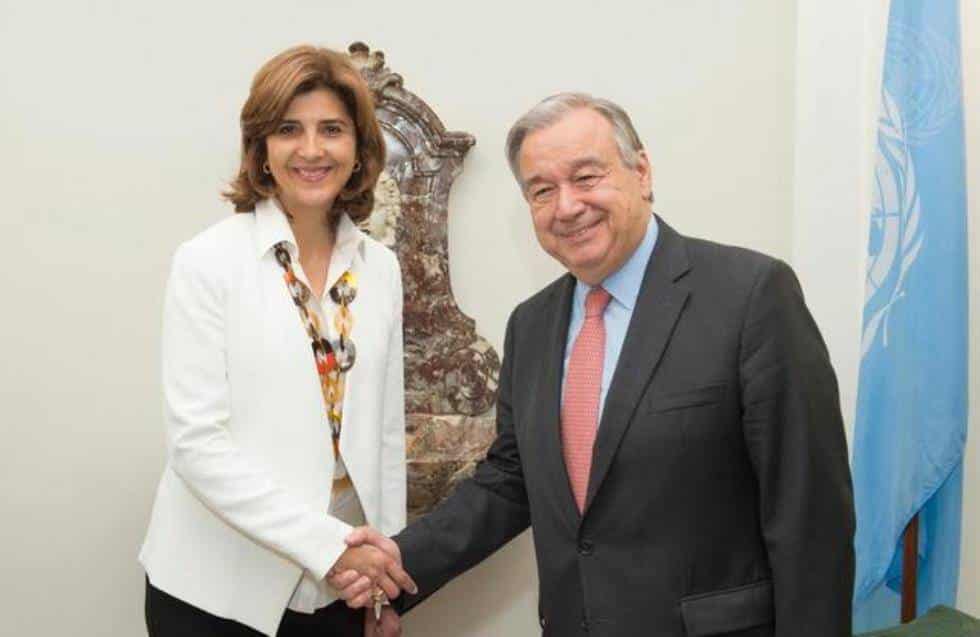Freud’s famous observation has always been evident in the Cyprus problem. The new UN envoy will have her work cut out
Maria Angela Holguin Cuellar was officially named last week as the UN secretary-general’s personal envoy to Cyprus. According to a short announcement by the UN she will assume her good offices role on behalf of the UNSG this month.
The good offices function of the secretary-general is a necessary part of his role as the UN’s top diplomat in the peaceful resolution of disputes. It has been the practice for many years for the role to be delegated to envoys with specific missions in mind to assist him. Ms Cuellar’s mission is to search for common ground on a way forward for the resumption of talks on the Cyprob and advise the UNSG accordingly.
Mission impossible? Perhaps, but as there is no common ground her job cannot be to search for something that is not there, but rather to probe and prod the parties towards common ground. The last time a Cuellar did this was when Perez de Cuellar was UN special representative in Cyprus at the critical time in Cyprus between 1975-1977 and then as UN secretary-general 1981-91 when he put forward various federal models to the parties. The problem he faced at the time was as much lack of common ground as it was lack of political will.
Perez de Cuellar, who died in 2020 aged 100, was Peruvian. Maria Cuellar shares the same surname but she is Colombian and no relation. The name Cuellar, pronounced kweyar, is the name of a town in the province of Segovia in Spain; as often happens, people have the surname of a place with which they have an ancestral link.
Ms Cuellar had been foreign minister of Colombia between 2010-2018 and her country’s permanent representative at the UN. And if the career trajectory of her namesake is anything to go by, her involvement with the Cyprob could make her candidate to succeed Antonio Guterres as UN secretary-general when he retires in 2026.
Gueterres had been reluctant to engage further with the Cyprob after the debacle at Crans-Montana in 2017 when the federal model came under severe strain and has now been abandoned by the Turkish side for a two-state solution.
Yet a federal Cyprus had been promoted by the Turkish side to replace the 1960 unitary state as early as January 1974 when Turkish prime minister Bulent Ecevit first floated the idea. In 1975 the Turkish Cypriots called their administration the “Turkish Federated State of Cyprus” in anticipation of a federal future; in 1977 the Makarios-Denktash high level agreements confirmed the parties were seeking a bicommunal federal republic, on Turkish Cypriot insistence; and when the “Turkish Republic of Northern Cyprus (TRNC)” unilaterally declared independence (UDI) in 1983 the late Turkish Cypriot leader Rauf Denktash said “it will facilitate the establishment of a genuine federation.”
Also a referendum on a UN-EU federal plan was put to Cypriots and 65 per cent of Turkish Cypriots voted in favour. It was rejected by 75 per cent of the Greek Cypriot population; though not necessarily because they were averse to a federal settlement in principle, but because their preferred model to join the EU was as a majoritarian unitary state.
A refined revised federal model was put forward in 2017 at Crans-Montana but there remained unbridgeable differences with each side blaming the other for the collapse of the talks. The Greek Cypriot side blamed the Turkish side for insisting on exorbitant equality rights, and the Turkish Cypriot side blamed the Greek side for insisting on maximalist and unnecessary zero troops and zero guarantees from day one of a settlement.
Sigmund Freud’s narcissism of small differences was in full swing at Crans-Montana – as it has been since the inception of the Cyprob in 1963. Different ethnic groups in small societies tend to exaggerate small differences to which they are hypersensitive.
The differences at Crans-Montana that proved unbridgeable were tiny in comparison to what was at stake and how much had been agreed, and have since been compounded by the insistence on two-states by the Turkish side.
Two-states is anathema to Greek Cypriots as it is partition by another name which is off the scale set by the 1960 treaty of guarantee. Partition is as unacceptable to Greek Cypriots as union with Greece is to Turkish Cypriots, which is why both are excluded by the 1960 treaty.
By the way, for those who mistakenly believe the treaty of guarantee is no longer relevant, the use by the UK of the airbase at Akrotiri to attack the Houthis in Yemen on Friday was a salutary reminder of the other relevance of the 1960 treaties of guarantee and establishment. Under the treaties the RoC, Greece and Turkey are treaty-bound to guarantee UK the use of the airbase at Akrotiri even if their policy on military action may differ from that of the trigger-happy Anglo-Americans.
Most Cypriots regard the island of Cyprus as their common homeland where they wish to live in peace and security. Two-states is surplus to those requirements. The different models within the current treaties of establishment and guarantee are: a bicommunal unitary state along the 1960 model; a devolved bicommunal unitary state; a bicommunal federal state; or a bicommunal federal state lite. In light of the small differences at Crans-Montana those are the models within which the search for common ground is permissible under the 1960 treaties registered at the UN under article 102 of the UN Charter.
Alper Ali Riza is a king’s counsel in the UK and a retired part time judge







Click here to change your cookie preferences